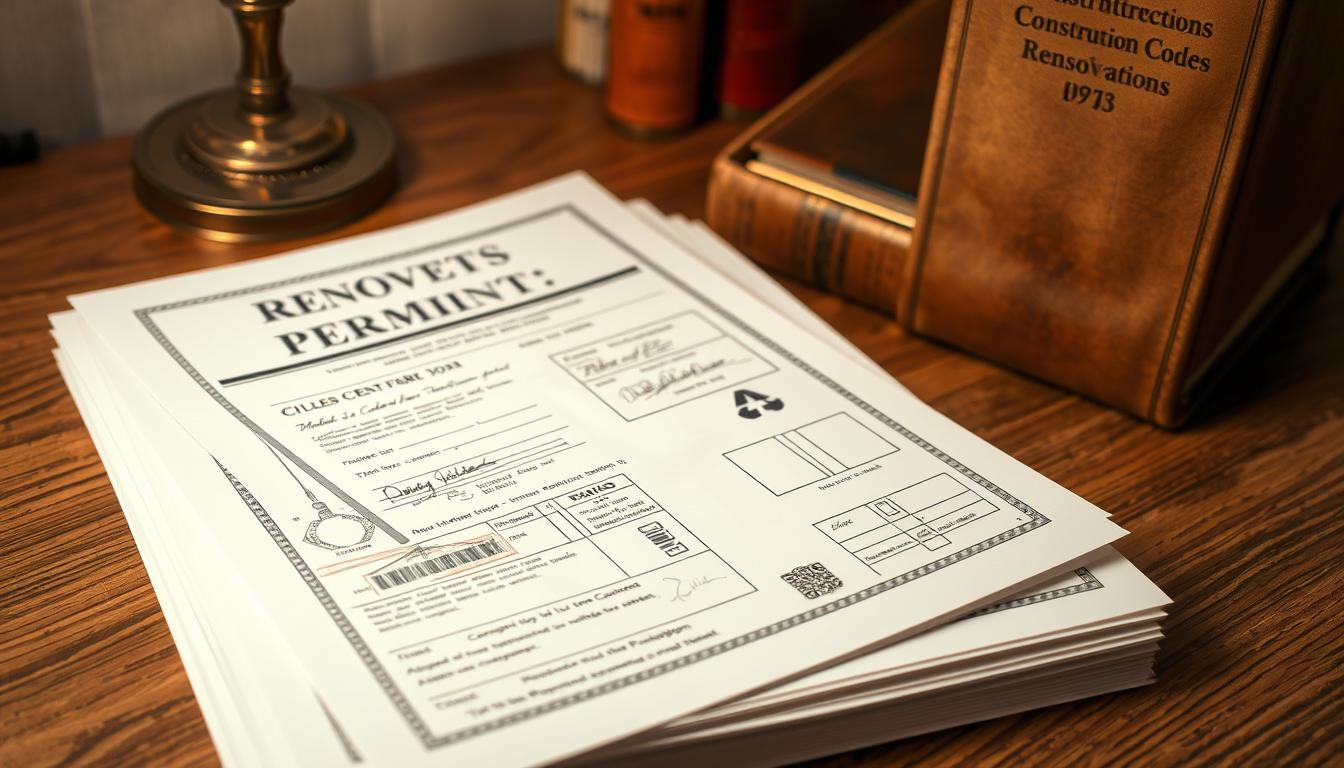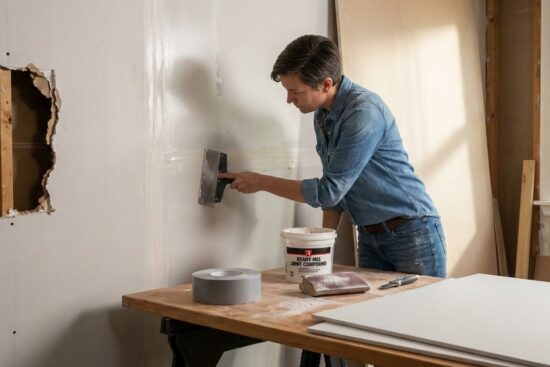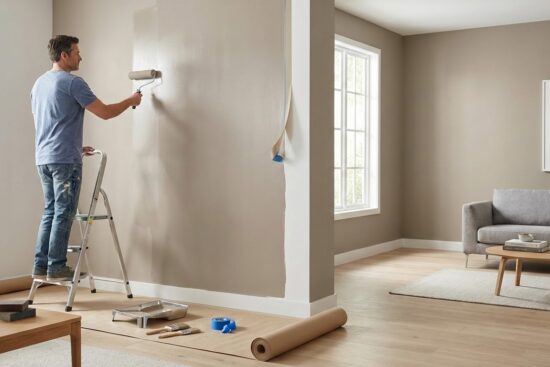
To avoid any legal and financial struggles, permits are mandatory for homeowners in the United States who are involved in home renovations. These permits are needed to be sure that your project is done in conformity with the set building standards. It is vital to learn the causes and conditions under which permits are needed.
Renovation permits are not mere formalities; they are there to assure your home is safe and conforms to the local laws. Building codes are measures to protect homeowners and their assets. Renovation permits may appear to be a commission of majority issues; however, they are an important clause in home renovation projects. By recognizing and communicating the importance of these permits and building codes in your renovation project, you can make a critical contribution to the success of the task and maintain a safe environment.
Key Takeaways
- Renovation permits are, in fact, the key to making sure that the renovation project conforms to the set building codes.
- Building codes are used to protect homeowners and their assets.
- Renovation permits must be required for most home improvement projects, including structural modifications and electrical work.
- Getting the needed permits can help you avoid dangers and ensure that your work is done exactly right and safely.
- Understanding the renovation permit process will allow you to navigate it easily and thus, avoid delays.
- Renovation permits are an essential part of the assurance that your home will be safe and conform to local regulations.
Renovation Permits and Their Importance
Renovation permits confirm that your home improvement is done in a safe, correct way and follows local building codes and regulations. Before you can even start a project, it is critical to obtaining your permits as well as learning about the regulations in place. Bypassing this can result in severe debacles; fines, legal problems, and health risks. Cooperate with licensed contractors and local authorities for a successful renovation.
The permitting process includes inspections to verify that the work is done according to the required standards. Inspectors assess if the building is stable, that any electrical and plumbing systems are installed correctly, and that the project complies with local zoning regulations.
Some major points in renovation permits include:
- Respect and follow local building codes and regulations
- Inspections to check whether the work is satisfactory
- Providing a strong and sound structure
When Do You Need a Permit for Home Renovations?
Homeowners often wonder when a permit is needed for their renovation projects. Normally, the answer will depend on the local regulations and how their conditions affect the need of the permit. Before you start any renovation project, verify with the local officials if you are obligatory to obtain a permit. This way, you not only will protect your investment but it will give you peace of mind.
Several renovation tasks commonly need permits, such as:
- Structural modifications, like adding or removing walls
- Electrical work, like installing new outlets or lighting fixtures
- Plumbing projects, such as fixing leaks or installing new fixtures
Local regulations are not the same in all places, and something that may require a permit in one place may not in another. If you are in doubt, it is best to contact the local authorities.
Types of Common Renovation Permits
Depending on your project’s breadth, there may be different permits that you might need. Common ones include the building structural modification permits. This refers to the modifications done to the foundation, walls, or roof of the building. Required inspections are the means that can state whether the work is carried out correctly and safely. Other permits are for wiring, plumbing, and HVAC system installations. A knowledgeable developer about the necessary permits and inspections can help homeowners complete projects with ease.
- Structural modification permits: for the changes that involve the building foundation, walls, or roof
- Electrical work permits: to be necessary for the installation of, or upgrade to electricity systems
- Plumbing permits: the needed documentation for the installation or repair of plumbing systems
- HVAC system permits: if there is a need, a system can be installed or upgraded to heating, ventilation, and air conditioning systems
The Cost of Building Permits
As you plan a home renovation, you should not forget to include your building permit expenses. Permit costs may be very high if the area has extremely different zoning and building regulations. Permit costs will also depend on the scope and complexity of the project and the inspections required.
A permit for building changes can cost anywhere from a few dollars to several thousand dollars. For instance, a simple renovation might need a permit costing around $500. In contrast, the room addition project can be quite complex and take a permit amounting to more than $2,000.
Including permit costs in the renovation budget is a smart thing to do for homeowners. It is essential for them to research the local regulations and building codes so that they can estimate the costs accurately. This method helps to prevent unexpected expenditures and facilitate smooth project execution.
The cost of building permits can be determined by different factors:
- The type of project (e.g., renovation, addition, new construction)
- The complexity of the project (e.g., electrical, plumbing, HVAC work)
- The need for inspections and approvals
- Local regulations and building codes in the area
Renewal Permit Application
Even though it seems daunting to apply for renovation permits, in reality, it is feasible. First of all, you need to get the significance of inspections. These inspections blueprints the verification that your renovation not only meets local building codes but also follows all regulations.
Initially, all the required documents have to be gathered. Your paper folder is to contain blueprints, specifications, and also permits from previous renovations. Don’t forget to check with your local authorities about the location-specific variances in application process.
Documents Required
- Blueprints and plans for the renovation
- Specifications for materials and labor
- Permits from previous renovations (if applicable)
Application Submission Method
After gathering all the necessary documentation, you can go ahead and submit your application. The submission can be made either online or in person, depending on the preferences of local authorities. Also, you need to be ready with the required payment and wait for a few days to weeks for the processing period.
Expected Timeline for Processing
Once you submit your application, you generally have to wait till you get the approval. The expected time of waiting will vary with the intricacy of renovation and also the local authority’s workload. Therefore, it will be of good value if you can afford to be patient and make necessary prior arrangements. Also, inspections will be organized for the garden to meet all the required standards.
Building Codes and Local Regulations
When renovating your home, one of the most important things to do is to know the building codes and the local regulations. These rules differ greatly between the states and localities, thus you must research the specific laws in your area and follow them.
Generally, state regulations tend to be broader while local regulations can be more detailed and strict. As an illustration, the zoning laws could be a hindrance in renovating different styles in some particular zones. For the renovations of historical districts, the owners may need particular permits and the approval of the renovation plan seems to be a must. The first thing is to always discuss with local authorities and experts to get informed of all requirements you need to meet.
Understanding Zoning Restrictions
Zoning restrictions can significantly impact your renovation plans. You need to be familiar with what is allowed in your neighborhood. For example, size and height limits, as well as requirements for setbacks and parking, are among the most common restrictions.
Historic District Considerations
Historic district houses are subject to stricter regulations for the sake of keeping their charm. They can be rules for exterior renovations. For example, you might need to keep some original architectural features or use specific materials.
Working with Building Inspectors
For home renovations, inspections act as the backbone. Building inspectors are the ones who guarantee that the work is carried out safely and properly. The healthy and cooperative relationship is the key to work well with them. Good preparation by being ready for inspections and knowing what is expected is the way to go.
Openness and transparency in renovation plans and progress are very important. You must provide all the necessary documentation and be available to answer any questions. This is the kind of approach that ensures a seamless inspection process and prevents problems.
- Perform inspections by making available all the necessary documents and information in a ready and reachable form
- Be very open and transparent about the renovation plans and progress
- Timely and professional manner to address inspector’s any issues or concerns
By implementing those suggestions and creating a healthy relationship with the building inspectors, homeowners can ensure that the contract work is done correctly. In this case, they are able to clear the inspections with ease.
Common Permit Approval Challenges
When seeking permit approval, homeowners tend to face a multitude of challenges. The local regulations can be quite complicated and could cause application delays or even rejections. Local regulations constitute a huge part of the approval process and it is essential to comply with them. This involves adherence to building codes, zoning laws, and historic district rules. Application rejections or lengthy delays can be the result of non-compliance. Homeowners can better the permit approval process by identifying the challenges as well as addressing them beforehand.
In order to overcome common permit approval hurdles, the homeowners can adopt some strategies as follows:
- Work together with local authorities to make sure compliance with the local regulations
- Conduct thorough inspections to find out possible issues early on before applying
- Draw up a complete project plan that incorporates timelines and budget
Hiring Contractors for Permitted Work
When considering hiring the contractors for the work covered by the permit, you should look for the ones who are fully conversant with the local building codes and other regulations. Having a contractor who knows the rules inside out will keep you from making costly mistakes and exposing yourself to danger.
To find a reliable contractor, look for those with experience in permitted work and check their references. For instance, you may want to approach the local building department for recommendations, ask for references or check for online reviews. The key things to examine in a contractor before hiring are:
- Knowledge and experience involving permitted work
- Understanding of local building codes
- Trustworthy references and reputation
- Correct licensing and insurance
Obeying Laws and Building Codes When Remodeling
When a renovation is going on; it is necessary to follow the local legislation and building codes. This guarantees that the work is of the best quality and that all the inspections are carried out properly. Not following the rules can lead to fines, delays, and legal actions. Keeping organized is the key to avoiding the problems, and you have to be strict with the recordkeeping, make sure you schedule regular inspections, and, finally, be orderly to tackle the final approval process.
To fulfill, it is essential to understand what documents are needed, what inspections are needed, and what will be the final approval. Take into consideration:
Documentation Guidelines
It is the responsibility of the homeowners to keep accurate records of the renovation work. This includes all the permits, inspections, and approvals that were made, and those records help in the final process.
Inspection Timetables
Weekly inspections are an important part of checking the world class of the job done. Homeowners should book appointments with the authorities for inspections to prevent delays or penalties.
Final Approval Procedure
The final inspection mainly comes to check whether the work conforms to the standards and whether all inspections are completed. Homeowners have to supply all the papers needed and just wait for the answer from the authorities.
Flowing Smoothly Through the Permit Process
Home renovation projects start off with acquiring the necessary permits, as well as knowing the building codes and local laws. By following these preliminary steps, you will guarantee that your projects are both safe and legal. The inspection may seem hard, however, the officials can help you if needed. Obtaining the correct permits will be a huge safety step for you and your family. By taking the right measures you will be ready for a successful renovation.


